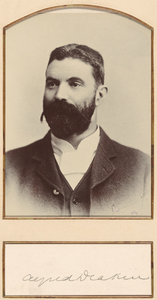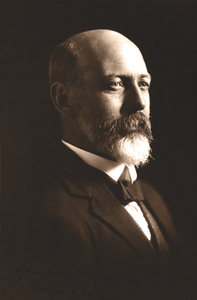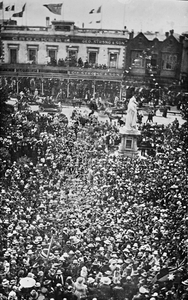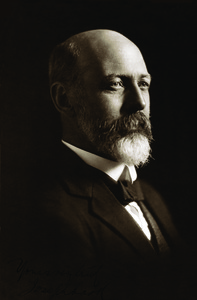Joseph Cook
Joseph Cook (1860-1947) began his political career as one of Labor’s foundation MPs in New South Wales in 1891. In 1893 he became Labor leader, but a year later was expelled for refusing to be bound by majority rule in caucus. He then joined the Free Trade government of Sir George Reid. He entered Federal Parliament in 1901, and was one of the founders of the Liberal Party in 1910. Briefly prime minister after the fall of the Labor government in 1913, he was defeated at the federal election of 1914. After the Labor split of 1916 he served as W.M. Hughes’s deputy in the Nationalist coalition, and with Hughes represented Australia at the Versailles Peace Conference in 1919.
Events
Fusion — the two-party system
Alfred Deakin forms a coalition of his Protectionist Liberal Party with the Free Trade Party led by Joseph Cook, known as the Fusion. It brings stability to the federal parliament and ends the fragile political coalitions that saw six changes of government in the first eight years after Federation.
TAGS

Joseph Cook becomes Prime Minister
At the 1913 election, Joseph Cook’s Commonwealth Liberal Party wins a one-seat majority and Cook replaces Fisher as Prime Minister. World War I breaks out in Europe during Cook’s term in office, and he commits Australian forces to fight for the British Empire. For more information, visit the Australian Prime Ministers Centre.
TAGS

Armistice and Treaty of Versailles (1918–19)
The armistice to end World War I is signed on 11 November, and the Treaty of Versailles is concluded in June 1919. The Treaty of Versailles creates the Covenant of the League of Nations, and is signed by Prime Minister William Hughes and Minister for the Navy, Joseph Cook. This is the first political treaty signed by Australian officials, and the first negotiated with direct participation by Australian Government delegates after Hughes insisted on Australia’s right to attend the Peace Conference in its own right rather than be represented by Britain. He also persuades leaders from New Zealand, South Africa, Canada and the United Kingdom to oppose Japan’s bid for a racial equality clause to be inserted in the Covenant of the League of Nations.
TAGS



